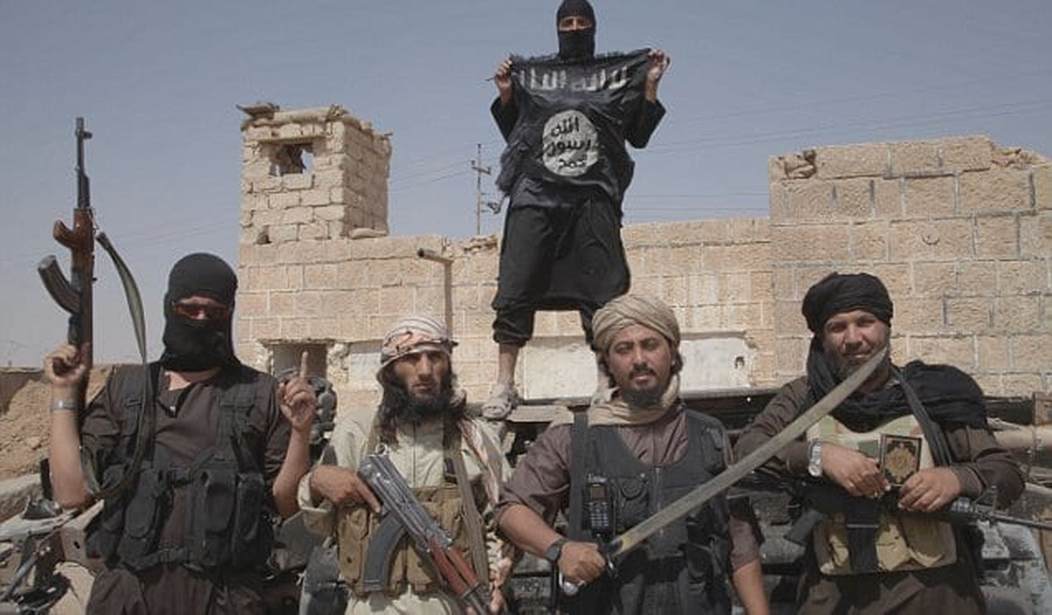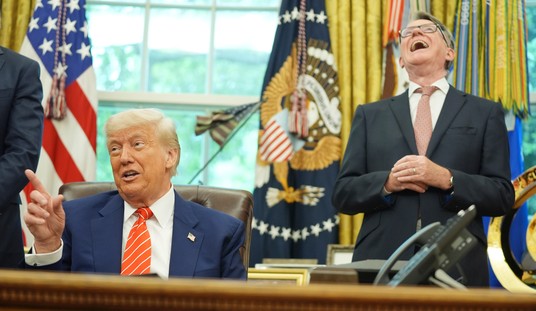A 34-year-old Tunisian ISIS fighter captured by Kurdish forces in Raqaa recently spoke to reporter Jenan Moussa of Al-Aan TV. When asked why he had joined the terrorist organization, the fighter confessed that Ennahda — the Muslim Brotherhood affiliate in Tunisia — had encouraged young fighters to join the jihad in Syria.
It’s not a coincidence, then, that Tunisia had the largest number of foreign fighters in Syria.
This deflates much of the U.S. think-tank and media establishment narrative that the Muslim Brotherhood serves as a “firewall” against jihadist groups:
D.C. 'Terror Analyst' Still Thinks Muslim Brotherhood a 'Firewall Against Violent Extremism' https://t.co/ajaHGyMsQW #homelandsecurity
— PJ Media (@PJMedia_com) May 5, 2016
Moussa’s report on her interview with the ISIS fighter can be found here (in Arabic):
تفاصيل يكشفها للمرة الاولى اسير تونسي عن مصير مقاتلَين امريكي و الماني في #داعش@jenanmoussa pic.twitter.com/2VfpdxWMMd
— Akhbar | أخبار الآن (@akhbar) July 13, 2017
She explains that during her two-hour interview with the captured ISIS fighter, they covered how he got to Syria, the travails of one American ISIS operative, and how he now wants to return to living with his wife and kids. He also explained that his motivation for joining ISIS was that the Muslim Brotherhood in Tunisia — which was the majority party in the government at that time — actively encouraged fighters to go to Syria and allowed that message in the mosques:
11/ He continued: "In Tunisia mosques said: 'Go for Jihad to Syria'. And we were told: No repercussions when u return to Tunisia. So I left"
— Jenan Moussa (@jenanmoussa) July 13, 2017
It’s remarkable that he claims they were promised no repercussions upon their return to Tunisia. The returning jihadist fighter problem is one vexing Tunisia, as well as a number of other countries (including the U.S.) with large numbers of citizens who fought in Syria:
How will Tunisia deal with thousands of returning jihadis? https://t.co/X22uikZFiU
— Al-Monitor (@AlMonitor) January 18, 2017
An estimated 6,000 jihadists from Tunisia went to Syria, making it the country with the largest number of foreign fighters:
How Tunisia became a top source of ISIS recruits https://t.co/vM82uEIC9u
— The Wall Street Journal (@WSJ) February 25, 2016
The top 5 countries where ISIS gets its foreign recruits https://t.co/Zs78cQvBOt
— TIME (@TIME) April 17, 2017
Going back to May 2013, the secular opposition parties charged Ennahda with encouraging the recruitment of fighters for Syria and looking the other way when they traveled:
VIDEO: The Tunisian fighters in Syria: Young jihadists from Tunisia are entering Syria to join the rebels batt… http://t.co/7X9BBSxanf
— BBC ME English (@bbcme) May 15, 2013
But it’s not like Ennahda’s role in sending jihadists to Syria has been a secret:
#Tunisia’s #jihadists: #Turkey facilitates, #Ennahda sees all http://t.co/V5X00xcnna #NOW_eng
— NOW English (@NOW_eng) October 31, 2014
Back in 2014, NOW Media reported:
Mohammad, the son of retired Tunisian army officer Amin al-Susi, “emigrated” to Syria to “wage jihad.”
When his father went to see Rachid Ghannouchi, leader of the Islamist Ennahda Movement, accompanied by another family whose son also went to Syria, Ghannouchi told them: “It is better for your son to die in Syria than here. He will be a martyr and he will mediate for you on Judgment Day. Fighting Bashar al-Assad is better than staying here.”
Susi stresses that what Ghannouchi said to the two families, who had gone to him for help getting their sons back, reopens the case of Ennahda’s responsibility for the growth of the phenomenon of Tunisians going abroad to fight while the party held power. Despite the fact that Ennahda does not actively participate in sending young people to Syria, and despite the fact that its support bases have remained uninvolved in “emigration for jihad,” a comprehensive Muslim Brotherhood-affiliated ring has been involved. This involvement took place in Tunisia, Libya and Turkey, and the Muslim Brotherhood has long and influential arms in those three countries.
I reported here at PJ Media last month about recent reports implicating Rachid al-Ghannouchi in the assassination of one of his top rivals:
Tunisia's 'Moderate Muslim Brotherhood' Leader Ghannouchi Accused in Assassination of Political Rival https://t.co/4cpicjGDm7 @pjmedia_com pic.twitter.com/6Uq1eg1Flg
— Patrick Poole (@pspoole) June 28, 2017
It was not just the Muslim Brotherhood in Tunisia that was involved in encouraging jihadists to go to Syria. In Egypt, the Muslim Brotherhood spokesman-turned Egyptian president Mohamed Morsi encouraged such recruitment. Just weeks into his tenure, Morsi was encouraging fighters to travel to Syria during a summit of non-aligned countries in Tehran:
Egypt says Syria's "oppressive regime" must go http://t.co/472K35SU
— Reuters World (@ReutersWorld) August 31, 2012
And on June 16, 2013, he led a rally at a Cairo stadium filled with clerics engaged in anti-Shia rhetoric openly calling for jihadists to fight a holy war:
Morsi seen to endorse holy war on Syria http://t.co/eX5X66oLZy
— The Times of Israel (@TimesofIsrael) June 16, 2013
The Associated Press reported on the rally:
On Saturday, Morsi attended a rally by hard-line clerics who have called for jihad and spoke before a cheering crowd at a Cairo stadium, mainly Islamists. Waving a flag of Egypt and the Syrian opposition, he ripped into the Syrian regime, announced Egypt was cutting ties with Damascus and denounced Lebanon’s Shiite Hezbollah guerrillas for fighting alongside Assad’s forces.
Clerics at the rally urged Morsi to back their calls for jihad to support rebels. Morsi did not address their calls and did not mention jihad. But his appearance was seen as in implicit backing of the clerics’ message. It came after a senior presidential aide last week said that while Egypt was not encouraging citizens to travel to Syria to help rebels, they were free to do so and the state would take no action against them.
Khalil el-Anani, an Egyptian expert on Islamist groups, called the move “Morsi’s endorsement of jihad in Syria” and warned it was “a strategic mistake that will create a new Afghanistan in the Middle East.”
“He is pushing Egypt into a sectarian war in which we have no interest,” he said.
The new tone in Egypt risks fueling the flow of Egyptian jihadi fighters to Syria, where the conflict is already increasingly defined by the sectarian divide, with the mostly Sunni rebels fighting a regime rooted in the minority Alawite sect, an off-shoot of Shiite Islam, and backed by Shiite Iran and Hezbollah.
Morsi’s rally was reportedly one of the main reasons that the leadership of the Egyptian army turned against him following massive anti-Morsi protests a few weeks later, which prompted his removal by the army:
Morsi role at rally calling for jihad in Syria "seen as tipping point" for Egypt's army – Reuters http://t.co/JGtVggNTDq
— Mary Fitzgerald (@MaryFitzger) July 3, 2013
In Qatar, senior Muslim Brotherhood clerics, including their top jurist Yusuf al-Qaradawi, held rallies calling for jihad in Syria:
Members of the opposition Syrian National Council, which has been meeting in the capital Doha, joined the rally by several hundred people after the main weekly Muslim prayers, an AFP correspondent reported.
Qaradawi told demonstrators that the rally was aimed at “supporting the people of Syria,” where more than 6,000 people have been killed since pro-democracy protests erupted in March last year, according to activists.
The Sunni cleric called on Syrian troops ordered to take part in the government’s deadly crackdown to “align with the people and let go of the regime.”
Another leading member of Qaradawi’s grouping, Salahudin Sultan, appealed to Gulf leaders to arm rebel fighters in Syria and send troops to back them.
“King of Saudi Arabia, emir of Qatar, take out the weapons and hand them over to those free people,” Sultan said.
If Salah Sultan mentioned in the article sounds familiar to PJ Media readers, it’s because he’s my former Ohio neighbor whom I’ve reported on frequently over the years:
A Blast From My Past ➤ Yes, my former neighbor really was a racist, terror supporting Muslim Brotherhood cleric https://t.co/QD8Qa4b0ic
— Patrick Poole (@pspoole) April 5, 2017
With the defeat of ISIS in its two Syrian and Iraqi strongholds of Raqqa and Mosul, we can expect more information to come out about the various forces behind the terror groups and stories from the foreign fighters that joined them, including the role of the Muslim Brotherhood.
The ongoing crisis among Arab countries over Qatar’s role in financing terrorism is also exposing the connections of the Muslim Brotherhood to the international terror networks:
America's Arab Muslim Allies Move Against the Muslim Brotherhood, 'Smart Set' Doubles Down Support https://t.co/eaRC4TxvCY via @pjmedia_com
— Patrick Poole (@pspoole) June 29, 2017
But as the “moderate Muslim Brotherhood” myth continues to unravel and pressure continues to build for designating the group as a terrorist organization — as many other American allies already have — we shouldn’t expect to see any wavering of support by the Washington, D.C. think tanks or the establishment media. Despite the growing evidence to the contrary, they will most likely hold on to the Muslim Brotherhood talking points more devoutly than any religious creed.








Join the conversation as a VIP Member